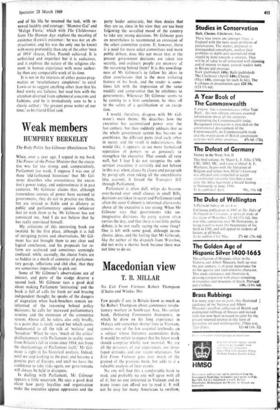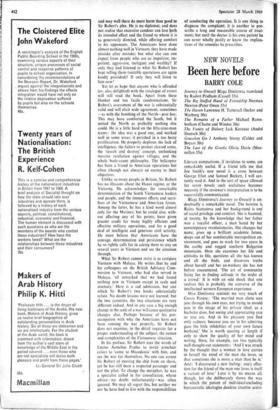Macedonian view
T. B. MILLAR
Few people if any in Britain know as much as Sir Robert Thompson about communist revolu- tionary warfare in South-east Asia. His earlier book, Defeating Communist Insurgency. in which he drew on his long experience in Malaya arid somewhat shorter time in Vietnam, remains one of the few essential textbooks on a subject whose literature accumulates daily. It would be unfair to expect that his latest work should comprise wholly new material. We are all the prisoners of our experiences, our deve- loped attitudes and our recent utterances. No Exit From Vietnam goes over much of the ground of the previous book. but adds to it a valuable analysis of later events.
No one will find this a comfortable book to read, and probably no one will agree with all of it; but no one interested in Vietnam and its many issues can afford not to read it. It will not be easy for many Americans to swallow,
and may Well there do more harm than good to Sir Robert's plea. He is no diplomat, and does not realise that excessive candour can lose both
its intended effect and the friend to whom it is so generously directed, while offering comfort
to his opponents. The Americans have done almost nothing well in Vietnam; they have made mistake after mistake; but what else can one
expect from people who are to impulsive, im- patient, aggressive, inelegant and wealthy? If only they had listened to what Sir Robert has kept telling them (suitable quotations are again kindly provided)! If only they will listen to him now!
Yet let us hope that anyone who is offended (or, alas, delighted) with the catalogue of errors will still read the book. Apart from these blanket and too facile condemnations, Sir Robert's assessment of the war is substantially valid and will elicit wide agreement, sometimes —as with the bombing of the North—post hoc. This may have comforted the South, but it united the North as probably nothing else could. He is a little hard on the fifty-nine-man teams: the idea was a good one, and worked well in some areas; it perished in a too hasty proliferation. He properly deplores the lack of intelligence, the failure to protect cleared areas, the 'search and destroy' concept, unthinking massive retaliation against villages, and the whole body-count philosophy. The helicopter has been a friend to American operations but often (though not always) an enemy to their objectives.
Unlike so many people in Britain, Sir Robert has no illusions about the Hanoi regime, or the Vietcong. He acknowledges the remarkable determination of the South Vietnamese leaders and people, and the immense efforts and sacri- fices of the Vietnamese and American forces.
Among the latter, he has a kind word almost only for the Marines; but he could also, with- out affecting any of his points, have given greater credit for many highly efficient and effective military operations, and for a good deal of intelligent and generous civil activity.
He must believe that Americans have the courage, determination and persistence which he so rightly calls for in asking them to stay on several years in Vietnam and see the situation through.
What Sir Robert cannot resist is to compare Vietnam with Malaya. He writes _that he and his colleagues on the British Advisory Com- mission to Vietnam, who had also served in Malaya, 'all remarked that we had found nothing new in Vietnam except in scale and intensity.' Here is a sad admission, but one which Sir Robert's two books substantially refute. No doubt lessons were not learned; but the two countries, the two situations are very different indeed. And in any case a big enough change in the scale of a war will cause qualitative changes also. Perhaps because of his pre- occupation with why the Americans have not been running the war properly, Sir Robert does not examine, in the detail requisite for a proper understanding of the subject, the nature and complexities of the Vietnamese situation.
In his preface, Sir Robert uses the words of Lucius Aemelius Paulus to invite armchair critics to 'come to Macedonia' with him, and see the war for themselves. No one can accuse Sir Robert of steering the ship from on shore, yet he has still been a respected passenger and not the pilot. To change the metaphor, he was a specialist called in for consultation, whose advice—no doubt unfortunately—was often ignored. We may all regret this, but neither we nor he have had to live with the responsibilities
of conducting the operation. It is one thing to diagnose the complaint; it is another to pre-. scribe a long and reasonable course of treat- ment; but until the doctor is his own patient he can never wholly justify or know the implica- tions of the remedies he prescribes.



































 Previous page
Previous page